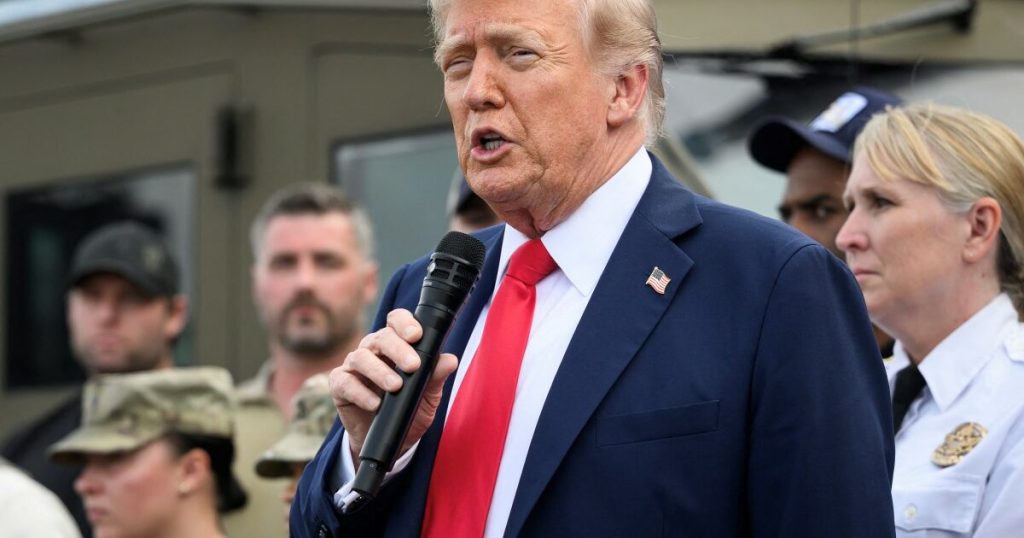The 2026 FIFA World Cup Draw: A Convergence of Sports, Politics, and Presidential Persona
The announcement of Washington D.C. as the host city for the 2026 FIFA World Cup draw, a momentous occasion in the world of sports, became intertwined with political undertones and the distinctive persona of US President Donald Trump. This decision, revealed alongside FIFA President Gianni Infantino, shifted the event from its initially planned location in Las Vegas to the Kennedy Center, a venue recently subject to Trump’s influence and rebranded, in his words, as potentially the “Trump-Kennedy Center.” The backdrop of this announcement, coupled with Trump’s handling of the iconic Jules Rimet trophy and his pronouncements on international relations and domestic policy, created a spectacle that blended the celebratory spirit of the World Cup with the often-controversial theater of Trump’s presidency.
Trump’s characterization of the World Cup as “the biggest, probably the biggest event in sports” underscored the significance he attached to hosting this global tournament during his second term. His interaction with the Jules Rimet trophy, typically reserved for heads of state and World Cup champions, further emphasized his view of the presidency as a platform for symbolic gestures and affirmations of personal success. Infantino’s presentation of the trophy to Trump, accompanied by the explanation that it was meant for “winners,” played into Trump’s self-proclaimed winner status. The lighthearted exchange about keeping the trophy and Trump’s admiration for the “beautiful piece of gold” highlighted his tendency towards theatricality and his appreciation for opulent displays.
The choice of the Kennedy Center as the venue for the draw added a layer of political significance to the event. Trump’s recent intervention in the Kennedy Center’s operations, driven by his perception of the institution as overly “woke,” transformed the venue into a symbol of his cultural influence. His suggestion of renaming it the “Trump-Kennedy Center” reinforced his tendency to personalize institutions and events, further blurring the lines between his political agenda and the ostensibly apolitical world of sports.
The backdrop of international relations also played a role in the announcement, with Trump hinting at the possibility of Russian President Vladimir Putin attending the World Cup. This speculation, contingent on the progress of peace efforts in Ukraine, injected an element of geopolitical intrigue into the event. Trump’s comments, while not committing to Putin’s attendance, suggested the World Cup could potentially serve as a stage for international diplomacy or, conversely, become a focal point for political tensions.
Trump’s broader political agenda also surfaced during the announcement, specifically his focus on crime reduction in Washington D.C. He linked the deployment of the National Guard to ensuring the safety of football fans visiting the capital, framing his domestic policies as integral to the success of the World Cup. This connection emphasized his tendency to connect seemingly disparate issues, using the platform of the World Cup to promote his law-and-order message.
The presentation of a “Row 1, Seat 1” ticket for the World Cup final to Trump further underscored the convergence of sports and politics. This symbolic gesture, while customary for host nation leaders, resonated with Trump’s emphasis on status and privilege. It also reinforced the idea of the World Cup as a stage for showcasing national pride and presidential authority.
Trump’s handling of the Jules Rimet trophy, a brief moment of apparent fumbling followed by Infantino’s steadying hand, provided a small but telling insight into the carefully orchestrated nature of these public appearances. While seemingly minor, this incident highlighted the delicate balance between spontaneity and control in political theater. The quick intervention by Infantino ensured that the narrative remained focused on the celebration of the World Cup rather than any potential gaffes.
The announcement of the World Cup draw location became a microcosm of Trump’s presidency, blending sports, politics, and personal branding. His remarks, the chosen venue, and the symbolic gestures all contributed to an event that transcended the purely sporting realm and entered the sphere of political performance. The intertwining of these elements created a complex narrative that reflected Trump’s unique style of governance and his tendency to personalize even global events like the World Cup.
The selection of the Kennedy Center, a venue steeped in cultural significance but recently subject to Trump’s influence, encapsulates the broader theme of his presidency: the intersection of politics, culture, and personal branding. His pronouncements on the venue, his interaction with the FIFA president, and his pronouncements on international relations and domestic policy all converged to create a spectacle that was as much about Trump himself as it was about the upcoming World Cup.
The event also underscored the power of sports to serve as a platform for political messaging. Trump’s linking of the World Cup to his domestic policies, specifically his focus on crime reduction, demonstrated his understanding of the symbolic capital of major sporting events. By connecting the World Cup to his political agenda, he aimed to leverage the global appeal of football to bolster his image and promote his policies.
The presence of Gianni Infantino, the FIFA president, added another layer of complexity to the event. His participation in the announcement, his presentation of the Jules Rimet trophy, and his presentation of the “Row 1, Seat 1” ticket all served to legitimize Trump’s pronouncements and reinforce the connection between the presidency and the World Cup. Infantino’s role in the carefully choreographed event highlighted the intricate dance between sports organizations and political leaders.
The announcement, while ostensibly about the World Cup draw, became a platform for Trump to showcase his persona, promote his political agenda, and solidify his connection to a global sporting event. The carefully constructed narrative, the symbolic gestures, and the interplay between Trump and Infantino all contributed to a spectacle that transcended the world of sports and entered the realm of political theater. This event showcased how, under Trump’s leadership, even seemingly apolitical occasions could be transformed into opportunities for self-promotion and the advancement of a political agenda.


